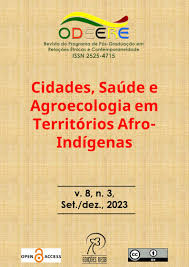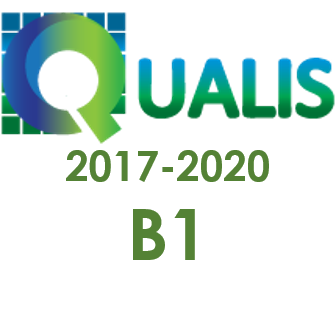Currículo e relações étnico-raciais em uma escola no campo no município de Amargosa-Ba
DOI:
https://doi.org/10.22481/odeere.v8i3.13005Palavras-chave:
Currículo, Educação no campo, Relações Étnico-RaciaisResumo
Este artigo apresenta uma análise sobre o currículo da escola no campo e as relações étnico-raciais no município de Amargosa-Ba, município localizado no território de identidade do Vale do Jiquiriçá. O lócus da pesquisa foi a escola municipal Margarida Maria Alves. As análises foram realizadas por meio da leitura do Projeto Político-Pedagógico e dos Planos de Ensino dos professores das disciplinas de Língua Portuguesa, História, Ciências e Artes. Os documentos curriculares analisados apontam indícios de que a educação no campo do município está sendo trabalhada com o paradigma da educação no campo funcional, porque reconhece as diferenças, todavia, o município ainda adota nas escolas do campo um currículo urbano. Algumas ações inseridas no plano de ensino dos professores indicam que os conteúdos referentes às relações étnico-raciais, estão presentes no cotidiano da escola, ainda que de forma bem tímida, sobressaindo-se na disciplina de História.
Downloads
Referências
BAHIA. Prefeitura Municipal de Amargosa. História da cidade de Amargosa -Ba. Disponível em: https://cidades.ibge.gov.br/brasil/ba/amargosa/historico.BARDIN, Laurence. Análise de Conteúdo. 70. ed. Lisboa: Persona, 1977.BENEVIDES, Maria V. Educação em direitos humanos: de que se trata? Palestra de abertura do Seminário de Educação em Direitos Humanos, São Paulo, 18 fev. 2000. Disponível em: http://portal.mec.gov.br/seb/arquivos/pdf/Etica/9_benevides.pdfBRASIL. Lei 10.639/2003, de 9 de janeiro de 2003. Altera a Lei nº 9. 394, de 20 de dezembro de 1996. Diário Oficial da União, Poder Executivo, Brasília.CALDART, Roseli S. A Escola do campo em Movimento.Currículo sem Fronteiras, v.3, n.1, p.60-81, Jan/Jun 2003. Disponível em: https://www.passeidireto.com/arquivo/5645284/caldart-roseli-a-escola-do-campo-em-movimento/8CANDAU, Vera M. Multiculturalismo e educação: desafios para a prática pedagógica. In: MOREIRA, A. F.; CANDAU, V. M. Multiculturalismo: Diferenças culturais e práticas pedagógicas. Petrópolis, RJ: Vozes, 2008. Disponível em:
https://educarparaomundo.files.wordpress.com/2016/07/moreira-candau-multiculturalismo-diferenc3a7as-culturais-e-prc3a1ticas-pedagc3b3gicas.pdfCANDAU, Vera M. F. Diferenças culturais, interculturalidade e educação em direitos humanos.Educação. Soc, Campinas, v. 118, n. 33, p. 235-250, jan.mar. 2012.Disponível em: https://www.scielo.br/j/es/a/QL9nWPmwbhP8B4QdN8yt5xg/?format=pdf&lang=ptEUGENIO, Benedito; LEAL, Catiana N. A educação das relações étnico-raciais no currículo praticado de uma escola do campo. Odeere, vol.7, n.03, p. 167-180, 2022. Disponível em: https://periodicos2.uesb.br/index.php/odeere/article/view/11207. FERREIRA, Maria de F. A.; SANTANA, José V. J.; VERASTEGUI, Rosa L. Decolonialidade e educação para as relações étnico-raciais: um olhar sobre a branquitude e o racismo na escola. Odeere, vol.7, n. 2, p.50-70. Disponível em: https://doi.org/10.22481/odeere.v7i2.11086GIMENO SACRISTÁN, J. O Currículo: Uma reflexão sobre a prática. 3. ed. Porto Alegre: ArtMed,2000. GIMENO SACRISTÁN, J. O Que São os Conteúdos de Ensino? In: GIMENO SACRISTÁN, J.; PEREZ-GOMEZ, A. Compreender e transformar o ensino. 4 ed. Porto Alegre: ArtMed,1998, p. 149-195. GOMES, Nilma L. Um olhar além das fronteiras: educação e relações raciais.1. Reimp. Belo Horizonte: Autêntica, 2010.LOPES, Alice C.; MACEDO, Elizabeth.Teorias de currículo. Rio de Janeiro: Cortez, 2011.MOLINA, Mônica C. FREITAS, Helena C. A. Avanços e desafios na construção da educação do campo. Revista Brasileira de Estudos Pedagógicos, Brasília, v. 24, n. 85, p. 17-31, abr. 2011. Disponível em http://rbep.inep.gov.br/ojs3/index.php/emaberto/article/view/3072/2807OLIVEIRA, Inês B. de. Contribuições de Boaventura de Sousa Santos para a reflexão curricular: princípios emancipatórios e currículos praticadospensados.E-Curriculum, São Paulo, v.8 n.2, ago. 2012. Disponível em: https://revistas.pucsp.br/curriculum/article/view/10984OLIVEIRA, Luiz F.; CANDAU, Vera M. Pedagogia decolonial e educação intercultural e antirracista no Brasil. Educação em Revista, vol.26, n.01, p.15-40, 2010. Disponível em:https://www.scielo.br/j/edur/a/TXxbbM6FwLJyh9G9tqvQp4v/?format=pdf&lang=pt.PREFEITURA MUNICIPAL DE AMARGOSA. Dados das escolas no município de Amargosa/Ba.Disponível em: https://biblioteca.ibge.gov.br/bibliotecacatalogo.html?id=35691&view=detalhesRAMOS, Jéssica R. S. Políticas de currículo para as escolas do campo: entre negociações e articulações políticas.Currículo Sem Fronteiras, p. 871-894, dez. 2018. Disponível em: https://www.curriculosemfronteiras.org/vol18iss3articles/ramos-cunha.pdf
SANTANA, José V.J.; SANTOS, Vilmar J.; FERREIRA, Maria de F.A. Colonialidade, relações raciais e o ensino de Geografia: reflexões a partir das epistemes decoloniais. Odeere, vol. 7, n.2, p.71-92, 2022. Disponível em: https://doi.org/10.22481/odeere.v7i2.11088SANTOS, Boaventura S. Renovar a Teoria Crítica e Reinventar a Emancipação Social. São Paulo: Boitempo, 2007. SANTOS, Juliana B; EUGENIO, Benedito. Práticas pedagógicas e a educação das relações raciais na Escola Quilombola Alto Alegre: uma perspectiva intercultural. Cenas Educacionais, Caetité-Bahia -Brasil, v.6, n.e13165, p.1-24, 2023. Disponível em:https://revistas.uneb.br/index.php/cenaseducacionais/article/view/13165/11107SÁ-SILVA, Jackson R.; ALMEIDA, Cristóvão D. de; GUINDANI, Joel F. Pesquisa documental: pistas teóricas e metodológicas. Revista Brasileira de História & Ciências Sociais, Rio Grande do Sul, v. 1, n. 1, p.1-15, jul. 2009. Disponível em: https://periodicos.furg.br/rbhcs/article/view/10351SCHEWTSCHIK, Annaly. O planejamento de aula: um instrumento de garantia de aprendizagem.Anaisdo IV Seminário Internacional de Representações Sociais, Subjetividade e Educação, Fortaleza, 2017.SILVA, Filipe G. P. da. Os paradigmas que alicerçam os livros didáticos de História e Geografia da coleção didática Projeto Buriti multidisciplinar: um olhar através das epistemologias do Sul. 305f. Dissertação (Mestrado em Educação). Universidade Federal de Pernambuco, Caruraru, 2015.SILVA, Janssen F. daet al. Paradigmas da educação no campo: um olhar a partir dos estudos pós-coloniais latino-americanos.Revista Reflexão e Ação, Santa Cruz do Sul, v. 22, n. 2, p. 09-38, dez. 2014.Disponível em: https://online.unisc.br/seer/index.php/reflex/article/view/5100SOUZA, Murilo M. O. A educação popular no campo: entre o saber camponês e o conhecimento científico. Rev. Ed. Popular, Uberlândia, v.8, p.64-75, jan./dez. 2009. Disponível em: https://seer.ufu.br/index.php/reveducpop/article/view/20161SOUZA, Maria Antônia de. Educação no campo: políticas, práticas pedagógicas e produção científica.Educ. Soc., Campinas, p. 1089-1111, set./dez. 2008. Disponível em:https://www.scielo.br/pdf/es/v29n105/v29n105a08.pdfVASCONCELLOS, Celso S. Planejamento: projeto de ensino-aprendizagem e projeto político pedagógico. 9 ed. São Paulo: Libertad, 2000.VEIGA, Ilma P. A. Inovações e projeto político-pedagógico: uma relação regulatória ou emancipatória?Caderno. Cedes, Campinas, v. 23, n. 61, p. 267-281, dez. 2003. Disponível em: http://www.cedes.unicamp.br/.WALSH, Catherine. Interculturalidade crítica e pedagogia decolonial: in-surgir, re-existir e reviver. In: CANDAU, V. M. (Org.). Educação intercultural na América Latina: entre concepções, tensões e propostas. Rio de Janeiro: 7 letras, 2009. p. 12-42.WANDERLEY, Maria N. B. O mundo rural brasileiro: acesso a bens e serviços e integração campo-cidade. Estudos Sociedade e Agricultura, Rio de Janeiro, vol.
, n° 1, p. 60-85, 2009. Disponível em: https://revistaesa.com/ojs/index.php/esa/article/view/308
Downloads
Publicado
Edição
Seção
Licença
Copyright (c) 2023 ODEERE

Este trabalho está licenciado sob uma licença Creative Commons Attribution 4.0 International License.
Você é livre para:
Compartilhar - copia e redistribui o material em qualquer meio ou formato; Adapte - remixe, transforme e construa a partir do material para qualquer propósito, mesmo comercialmente. Esta licença é aceitável para Obras Culturais Livres. O licenciante não pode revogar essas liberdades, desde que você siga os termos da licença.
Sob os seguintes termos:
Atribuição - você deve dar o crédito apropriado, fornecer um link para a licença e indicar se alguma alteração foi feita. Você pode fazer isso de qualquer maneira razoável, mas não de uma forma que sugira que você ou seu uso seja aprovado pelo licenciante.
Não há restrições adicionais - Você não pode aplicar termos legais ou medidas tecnológicas que restrinjam legalmente outros para fazer qualquer uso permitido pela licença.














